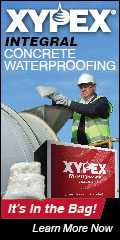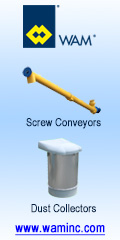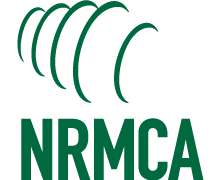
| Archive | nrmca.org | E-Store | Conferences & Events | Certifications | InFocus | Membership Directory |
RCC, Soil Cement Play Key Roles in World’s Fifth Largest Tilt-up Concrete Building The bustling Interstate 81 corridor that runs through Pennsylvania, Maryland and Virginia provides a critical link for commerce and the distribution of goods to cities along the East Coast. Hundreds of retailers and suppliers have strategically placed largescale manufacturing and distribution centers in this region, close to major interstate highways, intermodal rail yards and a strong work force. In Spring 2013, NRMCA member Conewago Enterprises, Inc. was tapped by Liberty Property Trust, a Philadelphia-based real estate development firm, to build one of the largest distribution centers in the United States on a 183-acre site in Franklin County near Shippensburg, PA. At 1,706,388 square feet, the tilt-up concrete structure with conventional steel framing would be the size of 30 football fields. It would become listed as the fifth largest tilt-up concrete building on record.
Perhaps the only thing more impressive than the scale of the project was the timeline in which it was completed. To meet the needs of Liberty Property Trust’s client, Conewago would have to build the largest building the company has ever constructed in just 13 months. Before answering to the timeline though, Conewago had to solve the immediate challenges of weak, silty soil conditions, which offered limited bearing capacity, and address several sinkholes that were also present on the site. To combat these conditions, Conewago utilized soil cement stabilization to increase the strength of the top layer of soil. This allowed the team to reduce the thickness of the floor slabs and paving sections, which helped save time and money.
Another major element of the project was the massive paved surface around the distribution center where tractor trailers would load and unload goods. Due to the challenging soil conditions and the anticipated high number of daily cycles of fully-loaded tractor trailers over the surface, Conewago selected Roller-Compacted Concrete (RCC) as the primary paving material. The use of RCC provided substantial savings for Liberty on the project. The ease of construction and high production rate of RCC helped Conewago stay on schedule and provided a surface that will stand up to heavy duty truck traffic for decades to come. Over a four-month period, Conewago placed more than 45,000 cubic yards of RCC on the Shippensburg project.
"RCC has proven to be stronger than conventional paving methods, but most times you don’t utilize the full strength of RCC on a project," said Donald B. Smith, Jr., president of Conewago. "With the weaker soil and other factors we faced at Shippensburg, the utility and capacity of the product really shined through. RCC is a perfect option for these types of projects." For more information, contact Pennsylvania Concrete and Aggregate Association (PACA) Director of Promotion Ken Crank at ken@pacaweb.org or Concrete Promoter Bruce Cody at bruce@pacaweb.org.
|
|
|








